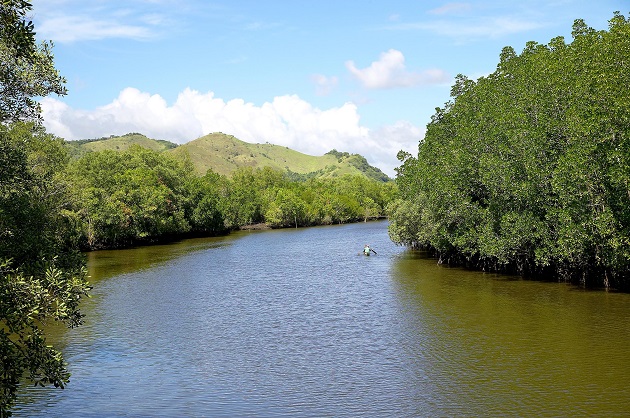
May 19, 2021 Wednesday

The 1,472 hectares Candijay Mangrove Forest in Panadtaran, Candijay, Bohol houses at least 36 species of mangroves, most of which are “bakauan” or the Rhizophora Stylosa. Photo from https://www.bohol-philippines.com/candijay-mangrove-forest.html.
MANILA, 20 May 2021 — The Climate Change Commission (CCC) and its National Panel of Technical Experts (NPTE), in partnership with RARE Philippines and the UP Marine Science Institute (UP-MSI), successfully convened the first of the three-part online webinar series on the effects of climate change on coastal and marine ecosystems.
The virtual webinar, organized in celebration of the Month of the Ocean, gathered more than 500 participants, consisting of members of the academe and research institutions in the Philippines and abroad, government agencies, policymakers, and organizations leading community-based initiatives, to build awareness on the current and future state of marine and coastal ecosystems in the Philippines.
The said webinar featured presentations from NPTE members Dr. Laura T. David and Ms. Lourdes Tibig, and Dr. Caroline Marie B. Jaraula, Assistant Professor from UP-MSI on their studies on historical climate data and evolution of marine and coastal ecosystems and the highlights of ocean acidification as reported on the IPCC Special Report on the Ocean and Cryosphere in a Changing Climate (SROCC).
“When we talk about climate change in the marine environment, we don’t just talk about temperature change, which is usually the focus in the terrestrial environment. We also talk about the changes in the patterns, the delivery of rainfall, as well as extreme events in that area, ocean acidification, and sea level rise,” said Dr. David.
“We will look into the geologic records as a proxy record especially in critical areas or times where we do not have ample data sets that were measured. We’re also looking at the present-day analogs of forecasted global warming scenario, warmer seas, and effects of ocean acidification. Climate change is not just a physical process; it is a bio-chemical phenomenon that can impact our health, economy, food security, and geopolitical stability,” said Dr. Jaraula.
Tibig, one of the lead authors of the Intergovernmental Panel on Climate Change’s Special Report on the Ocean and Cryosphere in a Changing Climate emphasized that over the years, the ocean takes excess heat leading to the decline of its acidity level.
“Based on the global trends of the IPCC SROCC, the ocean has warmed unabated since 1970, and has taken up more than 90% of the excess heat in the climate system. The rate of ocean uptake of atmospheric carbon has continued to strengthen in the recent two decades in response to the increasing carbon concentration in the atmosphere. As a consequence, the ocean is continuing to acidify in response to ongoing ocean carbon uptake, and open ocean surface water pH is observed to be declining by a range of 0.017-0.027 pH units per decade since the late 1980s,” said Ms. Tibig.
Through his opening remarks, CCC Commissioner Noel Antonio Gaerlan encouraged the participants to drive positive actions within the communities in an effort to save the coastal and marine ecosystems.
“Marine life is vital to support human life. Our lives are linked closely to the ocean and the rich marine resources that it yields. We must act accordingly and work together to find the much-needed balance in using the resources of our oceans and protecting its biodiversity to ensure that it benefits us in a sustainable manner,” Gaerlan emphasized.
The three-part webinar series aims to provide the public a broader understanding of the importance of science and data for informed policies on oceans. This is aligned with the overall goal of the United Nations Decade of the Ocean Science for Sustainable Development (2021-2030) with the message, “The Science We Need for the Ocean We Want”. The full webinar can be accessed through this link: https://www.facebook.com/CCCPhl/videos/2935422240112073
The second part of the online webinar, airing on Tuesday, May 25, will focus on how the climate is changing in the country and specifically its impact on local coastal communities.
For more information about the “Climate Change is Changing our Coastal and Marine Ecosystems”, visit the Facebook page of the Climate Change Commission at www.facebook.com/CCCPhl.